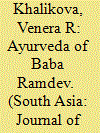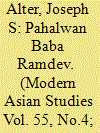|
|
|
Sort Order |
|
|
|
Items / Page
|
|
|
|
|
|
|
| Srl | Item |
| 1 |
ID:
153017


|
|
|
|
|
| Summary/Abstract |
This paper examines a cultural politics of nationalism and alternative medicine in India. It investigates the rhetoric of a popular guru, Ramdev, who criticises ‘the West’ and promotes ‘homegrown’ yoga and Ayurveda for strengthening individual bodies and the body of the nation. I argue that the expansion of the Ayurvedic market in India and Ramdev's personal success are both based on discourses that interweave a neo-liberal quest for health with nationalist sentiments and consumerist desires. I show how yoga and Ayurveda—situated within narratives of citizens’ duty to consume the homegrown—have become political tokens of national belonging and biomoral consumerism.
|
|
|
|
|
|
|
|
|
|
|
|
|
|
|
|
| 2 |
ID:
165237


|
|
|
|
|
| Summary/Abstract |
This article is a preliminary attempt to understand the dynamics of how Patanjali and Baba Ramdev represent ‘Hindu nationalism’, or Hindutva (Hinduness) in Nagaland, India. One can read Baba Ramdev's foray into the region through the promotion of yoga, Ayurveda, and national health, as a form of ‘neo-Hindutva’ that is increasingly diffuse and moves away from a more militant pathway of established Hindutva designs. If one considers the work of Patanjali in Nagaland as an attempt to homogenise and unify a set of practices surrounding food and health practices, then, one can read this as an attempt to assert a singular somatic imagination, increasingly influenced by Hindutva ideas about the body, ‘the health of the nation’, and the promotion of swadeshi (indigenous goods) as patriotic duty. This article highlights the way Ramdev and Patanjali's business empire is trying to move beyond the ‘cow belt’ of north India, comprising mainly of ‘Hindu-Hindi’ into regions that are more diverse linguistically and historically, and culturally viewed as ‘un-Indian’.
|
|
|
|
|
|
|
|
|
|
|
|
|
|
|
|
| 3 |
ID:
179410


|
|
|
|
|
| Summary/Abstract |
In the view of many people, Baba Ramdev embodies the practice of modern yoga in twenty-first century India. A tremendously successful entrepreneur, infamous ‘godman’ with political ties, and a highly visible TV personality, he is also a vocal supporter of pahalwani (Indian wrestling) as a way of life and of wrestling in India as a national sport. Beyond sponsorship of tournaments and support for a new professional wrestling league, he promotes a form of modern, nationalistic masculinity that draws on the ‘ideals’ of yoga, competitive athleticism, ‘Hindu’ conceptions of embodied power, and fetishized Vedic asceticism. In complex and often contradictory ways, Baba Ramdev's embodiment of these ideals shapes the bio-morality of wrestlers as they train, compete, and endorse his products. Critically analysed in terms of gender theory, his sponsorship of wrestling belies deep contradictions in religious nationalism, middle-class modernity, and in the gendered morality of both wrestling as a sport and yoga as a form of practice.
|
|
|
|
|
|
|
|
|
|
|
|
|
|
|
|
|
|
|
|
|